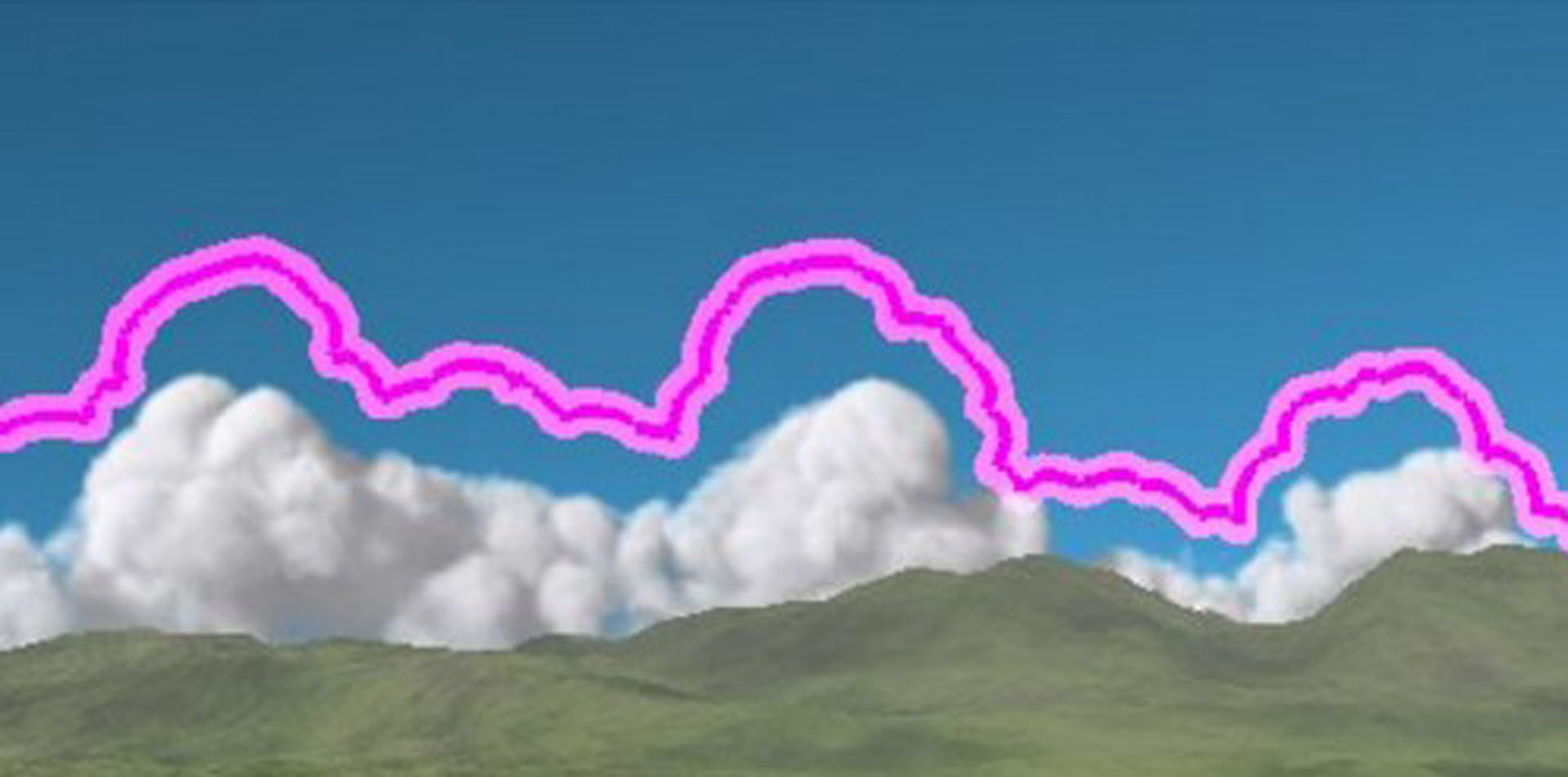“Feedback control of cumuliform cloud formation based on computational fluid dynamics” by Dobashi, Kusumoto, Nishita and Yamamoto
Conference:
Type(s):
Title:
- Feedback control of cumuliform cloud formation based on computational fluid dynamics
Presenter(s)/Author(s):
Abstract:
Clouds play an important role for creating realistic images of outdoor scenes. In order to generate realistic clouds, many methods have been developed for modeling and animating clouds. One of the most effective approaches for synthesizing realistic clouds is to simulate cloud formation processes based on the atmospheric fluid dynamics. Although this approach can create realistic clouds, the resulting shapes and motion depend on many simulation parameters and the initial status. Therefore, it is very difficult to adjust those parameters so that the clouds form the desired shapes. This paper addresses this problem and presents a method for controlling the simulation of cloud formation. In this paper, we focus on controlling cumuliform cloud formation. The user specifies the overall shape of the clouds. Then, our method automatically adjusts parameters during the simulation in order to generate clouds forming the specified shape. Our method can generate realistic clouds while their shapes closely match to the desired shape.
References:
1. Astrom, K. J., and Haqqlund, T. 1995. PID Controllers: Theory, Design, and Tuning. International Society for Measurement and Con.Google Scholar
2. Bouthors, A., and Neyret, F. 2002. Modeling clouds shape. In Proceedings of Eurographics 2004 (short papers).Google Scholar
3. Dobashi, Y., Kaneda, K., Yamashita, H., Okita, T., and Nishita, T. 2000. A simple, efficient method for realistic animation of clouds. In Proceedings of ACM SIGGRAPH 2000, Annual Conference Series, 19–29. Google ScholarDigital Library
4. Ebert, D. S., Musgrave, F. K., Peachey, D., Perlin, K., and Worley, S. 2002. Texturing & modeling: a procedural approach. Morgan Kaufman. Google ScholarDigital Library
5. Fattal, R., and Lischinski, D. 2004. Target-driven smoke animation. ACM Transactions on Graphics 23, 3 (Aug.), 439–446. Google ScholarDigital Library
6. Feldman, B. E., O’Brien, J. F., and Arikan, O. 2003. Animating suspended particle explosions. In Proceedings of ACM SIGGRAPH 2003, 708–715. Google ScholarDigital Library
7. Foster, N., and Fedkiw, R. 2001. Practical animation of liquids. In Proceedings of ACM SIGGRAPH 2001, 23–30. Google ScholarDigital Library
8. Gardner, G. Y. 1985. Visual simulation of clouds. Computer Graphics (Proceedings of SIGGRAPH 1985) 19, 3 (July), 297–304. Google ScholarDigital Library
9. Harris, M. J., Baxter, W. V., Scheuemann, T., and Lastra, A. 2003. Simulation of cloud dynamics on graphics hardware. In Proceedings of the ACM SIGGRAPH/EUROGRAPHICS conference on Graphics hardware 2003, 92–101. Google ScholarDigital Library
10. Haugen, F. 2004. PID Control Of Dynamic Systems. Tapir Forlag.Google Scholar
11. Hong, J.-M., and Kim, C.-H. 2004. Controlling fluid animation with geometric potential. Computer Animation and Virtual Worlds 15, 3–4 (July), 147–157. Google ScholarDigital Library
12. Igarashi, T., Matsuoka, S., and Tanaka, H. 1999. Teddy: a sketching interface for 3d free-form design. In Proceedings of ACM SIGGRAPH 1999, 409–416. Google ScholarDigital Library
13. Kajiya, J. T., and Herzen, B. P. V. 1984. Ray tracing volume densities. Computer Graphics (Proceedings of SIGGRAPH 1984) 18, 3 (Aug.), 165–174. Google ScholarDigital Library
14. Kim, Y., Machiraju, R., and Thompson, D. 2006. Path-based control of smoke simulations. In Proceedings of the 2006 ACM SIGGRAPH/Eurographics symposium on Computer animation, 33–42. Google ScholarDigital Library
15. Kim, B., Liu, Y., Llamas, I., Jiao, X., and Rossignac, J. 2007. Simulation of bubbles in foam with the volume control method. ACM Transactions on Graphics 26, 3 (July), Article 98. Google ScholarDigital Library
16. McNamara, A., Treuille, A., Popovic, Z., and Stam, J. 2004. Fluid control using the adjoint method. ACM Transactions on Graphics 23, 3 (Aug.), 449–456. Google ScholarDigital Library
17. Miyazaki, R., Yoshida, S., Nishita, T., and Dobashi, Y. 2001. A method for modeling clouds based on atmospheric fluid dynamics. In Proceedings of the 9th Pacific Conference on Computer Graphics and Applications, 363–372. Google ScholarDigital Library
18. Miyazaki, R., Dobashi, Y., and Nishita, T. 2002. Simulation of cumuliform clouds based on computational fluid dynamics. In Proceedings of EUROGRAPHICS 2002 Short Presentations, 405–410.Google Scholar
19. Neyret, F. 1997. Qualitative simulation of convective cloud formation and evolution. In Proceedings of Eurographics Computer Animation and Simulation Workshop 1997, 113–124.Google ScholarCross Ref
20. Nguyen, D. Q., Fedkiw, R., and Jensen, H. W. 2002. Physically based modeling and animation of fire. ACM Transactions on Graphics 21, 3 (Aug.), 721–728. Google ScholarDigital Library
21. O’Dwyer, A. 2006. Handbook of Pi and Pid Controller Tuning Rules. Imperial College Press.Google Scholar
22. Shi, L., and Yu, Y. 2005. Taming liquids for rapidly changing targets. In Proceedings of the 2005 ACM SIGGRAPH/Eurographics symposium on Computer animation, 229–236. Google ScholarDigital Library
23. Stam, J. 1999. Stable fluids. In Proceedings of ACM SIGGRAPH 1999, Annual Conference Series, 121–128. Google ScholarDigital Library
24. Thürey, N., Keiser, R., Pauly, M., and Rüde, U. 2006. Detail-preserving fluid control. In Proceedings of the 2006 ACM SIGGRAPH/Eurographics symposium on Computer animation, 7–12. Google ScholarDigital Library
25. Trembilski, A., and Brossler, A. 2002. Surface-based efficient cloud visualisation for animation applications. In Proceedings of The 10-th International Conference in Central Europe on Computer Graphics, Visualization and Computer Vision’2002 (WSCG 2002), 453–460.Google Scholar
26. Treuille, A., McNamara, A., Popovic, Z., and Stam, J. 2003. Keyframe control of smoke simulations. ACM Transactions on Graphics 22, 3 (July), 716–723. Google ScholarDigital Library
27. Ziegler, J. G., and Nichols, N. B. 1942. Optimum settings for automatic controllers. Transactions of the A. S. M. E. 64 (Nov.), 759–768.Google Scholar





